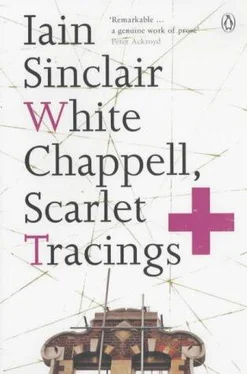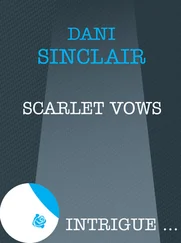Miami; nightclerk in a Colombian massage parlor, it’s very clean, whistling, scrubbing out the shower stall in his jockey-shorts. Heavy citizens. Silk suits. Hairy shoulders.
All front. Mindless. Mov-ing, baby. Julio. Angel. Chris Craft hijack, owners to the sharks. Cuban lift. Blowpipe technicians iced: too hot for the alligators. Bermuda Triangle scare-story video. Halter burns, shaved privates. Rectal meat-hook. The coke shoe. Gets out light, with the loss of one finger. One ring.
So it is that Nicholas Lane brings it to mind, driving alongside the London Hospital, rush hour, jerking forward on our nerves, the lit entrance, pillars, an opera, steps like a Hawksmoor church, diseased supplicants crawl in off the streets, remembers: that Nolan has been picked up in a raid, crashing, not his bust, too bad. Three years in Dorchester. Time to catch up on his Proust. View of the brewery, not Maiden Castle.
The ghost of the fox runs into a furnace of his own devising. Cover blown. Car shakes itself clear, a left, towards the river. The quadrivium that it cannot pass.
J. Leper-Klamm’s days slipped away from him under a sick pulse of strip-lighting, bisto coloured walls; overheated, underfed, detached, secretive, head down, left handed, scribbled his tight birdfoot markings behind a sheltering curve of arm. A long bandage of dirty cuff, unbuttoned, flapped at his wrist, giving him a convalescent look; unravelled pharaoh.
Mr Klamm was not entrusted with interviews, inquisitions, investigations, not expected to break the nerve of cocky self-employed decorators, or see through intricate webs of deceit. He was not a sweater; he psyched nobody out. Within the great block of the Moorgate Tax Offices Mr Klamm was a negligible presence; he filed letters, they were never seen again. He sent triplicate replies to defaulting company directors who had long since claimed their last expense account luncheon. His tongue tasted, permanently, of cheap glue. He was a redundancy waiting to be found out.
J. Leper-Klamm also had Europe’s largest holding, in private hands, of editions of A Study in Scarlet . He collected no other title. His collection had cost him many, many thousands and was worth, even bled at auction, many, many thousands more. His work was a disguise. Or was it? It gave him a number on the computer, a place in the Reich. Without it he would have been so invisible that he could not have functioned. A ghost cannot own books, a ghost cannot lock them into rooms that only he will ever enter.
A schoolmaster at one of the educational establishments on the Indian sub-continent, founded after the model of our high-Victorian Public Schools, had given the schoolboy Klamm, cuffs flapping, dank haired, propped on his elbow, inattentive, waiting, a copy of the Sherlock Holmes Long Stories, four volumes in one, John Murray, reprint, 1952.
Klamm went through the first story, A Study in Scarlet , carefully, line by line, and saw no reason to go any further. He didn’t read it again. But he wanted every copy that ever existed. His life was abdicated, his quest begun. Selfless Klamm, on the road to the Dharma.
It was known that Klamm lived, slept and ate, if he did eat, in a council flat in Lambeth. Nobody had visited him in it, but booksellers’ catalogues were sent to that address. It was rumoured in the trade, in the way that rumours become facts, that Klamm was a man of property, with holdings in India, with interests in Whitechapel. It was rumoured, it was whispered by young men in pinstripe suits and splashy ties, the Salon of the Rejected, who spent their days gossiping at their desks, licking their lip gloss, part of the furniture of what pretended to be the leading establishment for the sale of Modern First Editions, meaning anything that looked good in a glass cabinet, it was whispered, it was mooted, the legend became fact, that Klamm owned a house somewhere, nowhere, Clerkenwell or Finsbury or Holborn, a house that was never opened to daylight, whose few articles of use had been left undisturbed, sheeted, whose rooms were filled with shelves, whose shelves were filled with books, each book wrapped in tissue paper, sealed, placed within a brown paper bag, sealed again: that there were rooms and rooms, shelf upon shelf, nothing but wrapped books, like looking into a burial ground, erased inscriptions, neat lines, the gravestones covered in stocking-masks.
It was to this den that Nicholas Lane and the Late Watson decided to follow J. Leper-Klamm.
They skulked, unlikely, among the fleecy secretaries, the green accountants from Trinity College, Dublin, the company men, suited and shaped, jogging towards their first coronary.
The evening was mockingly mild. Leper-Klamm emerged in a long black coat, tethered to several bulging carrier-bags. He would be making for his sanctuary.
When he bought a book he would ask, unfailingly polite, humble as battery acid, ‘Could I trouble you, Sir? A brown bag? Thank you, thank you. And one more? Thank you, Sir. A carrier? Thank you.’
The fact that he was, single-handed, paying their salaries, allowing them to build quite amusing little collections of Uranian Verse, did not buy Mr Klamm any respect from the top of the market, Booksellers by Appointment to the country houses of England, the libraries of Nebraska. They bowed him in, they sniggered him out.
Along Finsbury Pavement, into the Square; its Babylonian follies, white brick Empires of Insurance, the architecture of fear. City Road, dissenting pocket: they dodge by railings and into Bunhill Fields. Leper-Klamm is bent over, hardly seems to lift his feet from the ground, propelled, by the wind, down well-oiled tracks; looks at nothing.
From behind Bunyan’s memorial Nicholas Lane whispers, ‘When he thinks he’s been watched — he sings.’ Nothing of that. The dull slab that marks the spot where the soul of William Blake is not : shaded path, railed-off boulders, holding down for ever the bloody minded, the hymn singers. Tanks of tap’d water from victims who never repined at their case. Klamm sings nothing. His lips move, a muttered monologue. ‘Do you have an edition of a book by Sir Arthur Conan Doyle, Sir? A Study in Scarlet ? Must be complete, Sir. Otherwise, condition unimportant. Thank you, Sir. Thank you.’ It’s almost a song.
Down Banner, now only a few feet behind him, Whitecross, and we are stopped by the sight of Hawksmoor’s obelisk, St Luke’s, white beacon, Nile finger. Leper-Klamm does not lift his head. Scrapes between cars, Helmet Row. Now he looks about him, draws out a key on a long piece of string.
We speed through the gate at the north side of the church, race round the path, diving into the shelter of a laurel bush, among its lacquered leaves and poison berries.
He’s at the door, beyond Micawber Machinery . He’s in. Shuttered tradesman’s mansion. Beneath the needle of unspent energies, within the protected space of that roofless enclosure; sunlight lifting the blood at the rims of the broken church windows. The obelisk seems to make light, not reflect it.
Leper-Klamm has dived out of time, by a tunnel of his own devising.
Nicholas Lane has supplied him in the past; it is decided that he will go in alone. And make the pitch irresistible.
There is no bell; he knocks, he hammers, he shouts. Nothing. No Klamm. He is absorbed into the shelves of books in brown paper wrappings. He is beneath a dustsheet. There is no sound of breath from the darkened house. He is most there when the house is empty.
Nicholas Lane scribbles a message on a sheet torn from his notebook. ‘We have a variant first issue — trial? proof? — of S. in S. Are you interested? Nicholas Lane.’ And, finding no slit in the wood of the door, he slides his communication underneath, letting it float into Klamm’s self-created fiction.
Читать дальше












